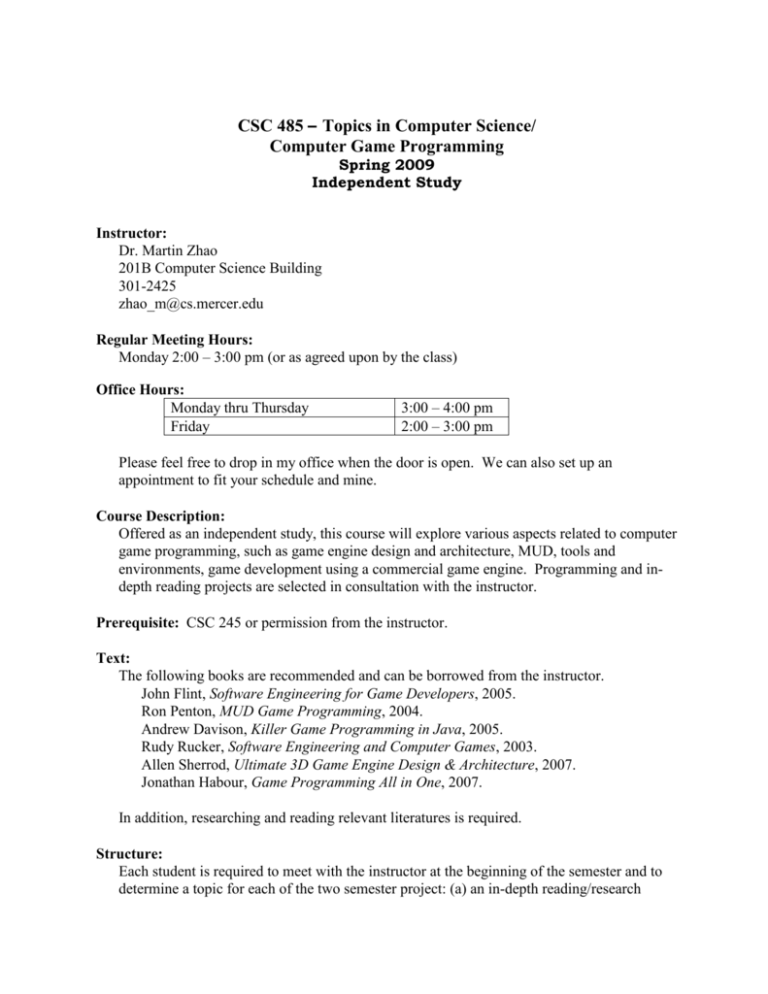Zhao, CSC485 S09 Syllabus
advertisement

CSC 485 – Topics in Computer Science/ Computer Game Programming Spring 2009 Independent Study Instructor: Dr. Martin Zhao 201B Computer Science Building 301-2425 zhao_m@cs.mercer.edu Regular Meeting Hours: Monday 2:00 – 3:00 pm (or as agreed upon by the class) Office Hours: Monday thru Thursday Friday 3:00 – 4:00 pm 2:00 – 3:00 pm Please feel free to drop in my office when the door is open. We can also set up an appointment to fit your schedule and mine. Course Description: Offered as an independent study, this course will explore various aspects related to computer game programming, such as game engine design and architecture, MUD, tools and environments, game development using a commercial game engine. Programming and indepth reading projects are selected in consultation with the instructor. Prerequisite: CSC 245 or permission from the instructor. Text: The following books are recommended and can be borrowed from the instructor. John Flint, Software Engineering for Game Developers, 2005. Ron Penton, MUD Game Programming, 2004. Andrew Davison, Killer Game Programming in Java, 2005. Rudy Rucker, Software Engineering and Computer Games, 2003. Allen Sherrod, Ultimate 3D Game Engine Design & Architecture, 2007. Jonathan Habour, Game Programming All in One, 2007. In addition, researching and reading relevant literatures is required. Structure: Each student is required to meet with the instructor at the beginning of the semester and to determine a topic for each of the two semester project: (a) an in-depth reading/research project related to game software design and development; (b) a semester game programming project. Students are encouraged to work on their programming project as a team, so as to produce working systems with features close to game systems that can be played freely online or purchased for a fee. A statement of goals for research and programming projects together with an initial plan must be submitted to the instructor by February 16, 2005. (Students to work as a team on their programming project can submit one statement for the whole team.) At the end of the semester, a final report is required for the reading project, as well as appropriate documentation for the programming project. Each student (or student team) will also be required to give a talk during a scheduled ACM colloquium time towards the end of the semester, demonstrating project or research progress. The instructor will be responsible for advising students about the appropriate preparation of colloquium presentations. The instructor will set up (weekly or biweekly) meetings with the class to check progress and give advice. Student teams need to make plans for their projects and keep track of schedule Course Objectives/Requirements: This class is offered as an independent study, and the student will take major responsibility to plan out so as to fulfill the course objectives/requirements as described below. 1. Completion of the statement of projects as described above. (10%) 2. Keep a complete set of literatures and reading notes, as well as documentation generated during the software development process, as specified in the plan. (20%) 3. Meet the instructor regularly to update progress. (10%) 4. Submit one report summarizing progress on in-depth reading/research project. (20%) 5. Submit a working game system, together with a set of documents (including design artifacts, commented codebase, test cases and results, user manuals, etc). (25%) 6. Demonstrate game system and/or present research summary in an ACM colloquium (10%). Attend at least three other ACM colloquiums (5%) Grading Policy: Graded based on the fulfillment of course requirements as described above. Reasonable accommodation: Students with a documented disability should inform the instructor at the close of the first meeting. The instructor will refer you to the office of Student Support Services (SSS) for consultation regarding evaluation, documentation of your disability, and recommendations for accommodation, if needed. Students will receive from SSS the Faculty Accommodation Form. On this form SSS will identify reasonable accommodations for this class. The form must be given to the course instructor for signature and then returned to SSS. To take full advantage of disability services, it is recommended that students contact the Office of Student Support Services, immediately. The office is located on the third floor of the Connell Student Center.



